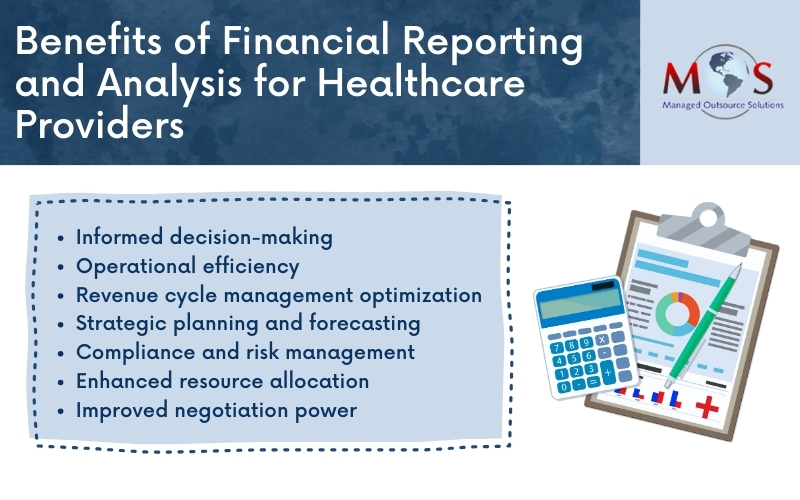Analyzing financial data in a healthcare practice is important for informed decision-making that promote financial health and overall sustainability. Financial reporting in healthcare supports a provider’s strategic decision-making. It allows practitioners to gain insights into revenue streams, identify cost patterns, and assess the fiscal performance of the organization.
Healthcare monetary reports in hospitals encompass a range of documents that provide insights into the financial performance, management, and strategic decisions of the institution. They include: income statement (Profit and Loss Statement), balance sheet, cash flow statement, budget vs. actual reports, accounts receivable aging report, utilization reports, RVU (relative value unit) reports, and more.
For professional medical billing services, financial management reporting is a crucial strategy for ensuring the fiscal well-being of a practice. It enables practices to deliver high-quality care while navigating the complexities of the healthcare landscape effectively.


Optimize your practice’s financial health with our comprehensive medical billing services and robust financial reporting and analysis.
Call (800) 670-2809
Importance of Financial & Clinical Reporting for Healthcare
With accurate financial analytics, practitioners can:
- Optimize resource allocation: Analysis of monetary data allows healthcare practitioners to assess how resources are used within the organization. This includes evaluating expenses, staff allocation, and equipment costs. By identifying areas of inefficiency or overspending, practitioners can strategically allocate resources to areas that need them the most, improving overall cost-effectiveness.
- Streamline operational efficiency: Financial analytics provides insights into the efficiency of operational processes within a healthcare practice. By examining financial data, practitioners can streamline workflows, and enhance overall operational efficiency. This optimization contributes to cost savings and improved service delivery.
- Enhance revenue cycle management: Revenue cycle management in medical billing involves overseeing the financial process of healthcare providers, from patient appointment scheduling to the final payment collection. Accurate financial reports enable practitioners to evaluate the effectiveness of revenue cycle processes, identifying areas for improvement, and making informed decisions to optimize revenue streams and operational efficiencies.
- Make informed decisions impacting patient care: Fiscal data analysis helps practitioners to make informed decisions that directly influence patient care. By understanding the economic implications of different courses of action, they can prioritize patient-centric initiatives, invest in necessary resources, and provide high-quality care without compromising financial sustainability.
- Facilitate compliance with regulatory requirements: Financial analytics helps practitioners track and adhere to regulations by providing visibility into monetary transactions, billing practices, and overall financial governance. This ensures that the healthcare practice operates within legal and regulatory frameworks, avoiding potential penalties and legal issues.


Optimize your revenue cycle!
Uncover key insights with our professional financial reporting and analysis!
Call (800) 670-2809
Top 10 Reporting Tools for Healthcare Financial Analysis
- Oracle Essbase
- Cube
- Zoho Analytics
- NetSuite
- QuickBooks
- Centage Planning Maestro
- Anaplan
- Sage Intacct
- Jirav
- Finmark
Beyond the balance sheets and income statements, these tools delve into the intricate financial landscape of healthcare, shedding light on trends, challenges, and opportunities that often go unnoticed. By analyzing medical billing data, a medical billing company can help providers unlock the full potential of their revenue cycle, enhance resource allocation, and maintain a robust financial foundation in an ever-evolving environment.





